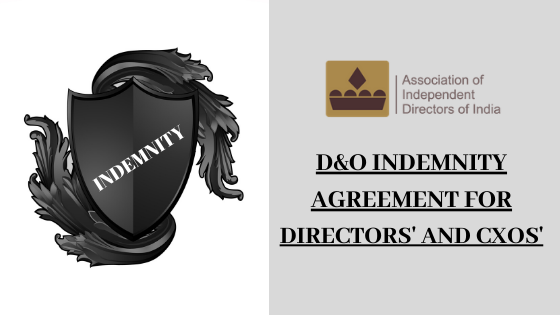The scope of a director’s duties and personal liability (civil and criminal) towards the company, shareholders and third parties have been uniformly distributed between all directors including Independent Directors under various statutes. The nature of duties under the Companies Act, 2013, and the extensive criminal liabilities extending thereof generate a compelling and meaningful deterrence for Independent Directors (due to their non-involvement in the matters of a company).
Directors and CXOs world over reach that level because of their qualifications, hard work, experience and special abilities i.e. because they add real value to the company. Most of them act in good faith for the betterment of the company but are not aware of all the laws the company needs to comply with. The facts gathered from various national newspapers and relevant case law in India (INX Media, Kingfisher Airlines, Satyam Computers) shows that in the last six months more than 200 Directors and CXOs have been prosecuted in criminal courts or sued in civil courts.
This happens largely because in India, given the diversity of work ethics and culture, professional Directors and CXOs have little knowledge of and almost no control over the actions and omissions of their fellow Directors, CXOs and the owners of the company. The labour laws in India ensure that a “blue-collar” workman receives substantial compensation (up to 60% of the last drawn monthly salary x 150) for injuries suffered at work i.e. burns, partial or permanent disablement and death). However, there is no law which provides for any compensation to Directors and CXOs for the injuries they suffer at work i.e. criminal prosecution, civil suits, bad publicity, loss of reputation and embarrassment, fines and imprisonment causing resultant mental trauma.
The increase in the number of “Compliance laws” and laws against money laundering, sexual harassment, new laws enabling vendors (MSME Act) and creditors (Insolvency and Bankruptcy Code) amendments in the Companies Act 2013 and policies like “Whistle Blower” have increased the vulnerability of the Directors and CXOs manifold. Currently, there are 28 laws under which Directors and CXOs can be held liable. Out of these 5 laws provide for imprisonment in the range of 7-10 years,3 laws provide for punishment in the range of 1 to 3 years, 6 laws provide for punishment of up to 6 months and the rest provide for fines which range between Rs.500-1,00,000/-.
Convincing the court that a Director or CXO was NOT responsible for the culpable action or omission, or that the event happened despite all due diligence from him/her, takes more than a year. In all such cases, regardless of the consequence i.e. conviction or acquittal, the Director or the CXO has to engage a lawyer and plead his/her defense which involves time, mental trauma and monetary costs. If a CXO is the highest officer in his department without being a Director he/she is equally liable. The truth of the legal aspect of the contemporary corporate world is that no one can be stopped from going to court or the media. The resultant damage for Directors and CXOs is substantial and in some cases permanent because the names remain on the internet. Furthermore, The D&O insurance taken by companies does not ensure that the Directors’/CXOs’ who need it will get it when they need it because they may not be on the Board when any proceedings start.
Therefore, the D&O Indemnity Agreement is the ONLY effective remedy in the hands of the Director or the CXO to ensure that the company promises to pay and actually pays for their legal expenses and that they are compensated for their mental trauma, loss of reputation, loss of employment, fines and/or imprisonment. This Agreement is executed between the company on the one hand and the Director/CXO on the other. It covers the entire tenure of the Director/CXO as a Director/CXO and seven years after resignation or retirement because under the Companies Act, the liability of the Director/ CXO survives resignation/retirement.
To avoid any conflict of interest, the Agreement should not be drafted by the lawyer advising the company. Each party should have its own lawyer. The D&O Indemnity Agreement should be customized on the realistic assessment of the risk profile of the individual Director/CXO. The risk profile of the Director/CXO depends on factors like his designation, role, length of tenure, nature of business of the company, number of employees, number of women employees and geographical locations of offices/factories. The assessment of the individual risk profile of the Director/CXO is done by accurately identifying the laws applicable to that Director/CXO and the analysis of the relevant case-law adding to that the perspective of the courts understood through a rich experience in corporate litigation and advising. The professional fees for drafting, negotiating and finalizing the D&O Indemnity Agreement on behalf of the Director/CXO are to be borne by the company and NOT the Director/CXO because he has acted entirely on behalf of the company and not for himself. The D&O Indemnity Agreement is a well-accepted part of the corporate culture in Europe and North America.
We at AIDI are glad to assist all such Directors and CXO’s who are interested in knowing more about the D&O Indemnity Agreement or getting the agreement executed. Please feel free to connect with us and we’ll be happy to take it forward with our Associate legal partners.

